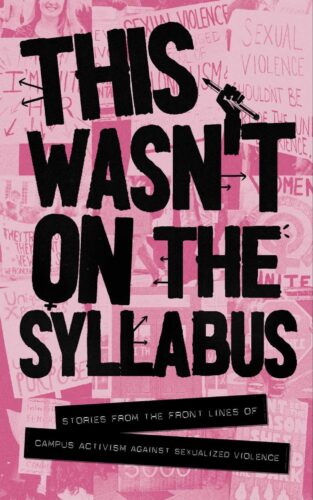Content Warning: This article contains mentions of sexual assault and harassment.
The idea for This Wasn’t on the Syllabus began as all great works do—with the question, “what if we wrote a book?” Addy Strickland and Emma Kuzmyk were undergraduate students enrolled in their final year at St. Francis Xavier University (St. FX) in Nova Scotia. In the span of just four short years, Strickland and Kuzmyk had penned articles, speeches, and open letters; attended marches and protests; and co-founded the St. FX Peer Support Program—a sexual violence support group for students, the first of its kind on their campus.
The idea for the Peer Support Program came as a result of a sexual violence case that made national headlines during their first year. The school administration addressed the incident in an email, but Strickland expresses that “there were no resources attached for students who might find [the news] distressing. That was…the wake-up call [for] us.” To date, there have been a number of high-profile sexual assault cases at St. FX, most notably in 2017 and 2023.
In Strickland and Kuzmyk’s senior year, a concept began to blossom—an anthology that would honour the critical work of student activists from various Canadian universities in response to campus sexual violence. Thus, following an entrepreneurship grant, an Instagram call for submissions, and a shockingly quick turnaround period for copyediting, This Wasn’t on the Syllabus: Stories from the Frontlines of Campus Activism Against Sexualized Violence was born.

This Wasn’t On the Syllabus
Thoughtfully curated into three sections—“What We Faced,” “What We Built,” and “How We Survived”—the anthology features reflections, poetry, speeches, and personal essays written by student activists. Highlighting contributors from 15 universities across 7 different provinces, the collection details their experiences with the lack of immediate, just, and survivor-informed policies enacted by their schools in the wake of sexual harassment and assault.
All deeply personal and poignant accounts, the chapters depict not only the harrowing and isolating incidences in which institution after institution failed students brave enough to report cases of sexualized violence, but also the emotionally charged and arduous tasks of building peer support groups and the journey of healing from trauma that created an impossibly heavy burden to carry.
According to Statistics Canada, one in every ten women was sexually assaulted while attending Canadian postsecondary institutions in 2019. Additionally, 71% of students reported witnessing or experiencing unwanted sexualized behaviour. In the face of these overwhelming statistics, students have been making their voices heard in a myriad of ways. Among other examples, the anthology details how Shelby Miller founded a near-national campaign inspiring students to wear teal ribbons in support of sexual assault survivors, how Michelle Roy’s viral Instagram post launched a series of protests at Mount Allison University, and how Cameron Smith fought diligently for Acadia University’s sexual violence policy to be amended.
Kuzmyk reflected on the unique challenges that student activism presents, commenting that “one of the things about being in an institution [is] there’s such power dynamics between yourself and the people that you’re advocating to.” Strickland agreed, adding that it was disorienting to try “to be a student and enjoy…what your university experience should be, as you’re also fighting to change it at the same time.”
Despite initial suggestions to modify the form of their project, both authors were “quite set” on a physical book in order to create a tangible and enduring legacy for the stories featured. “One thing about these stories is that they’ve existed so precariously in the past…in news articles, or just by word of mouth,” said Kuzymk. “It was really important to us that they exist in a physical form that would be permanent, and that people would be able to hold on to.”
View this post on Instagram
An integral part of the project was ensuring the creative process was survivor-centred from start to finish. Throughout the three-and-a-half-year publishing journey, Kuzmyk commented that contributors were reminded that they “had an ongoing opportunity to change things, to edit things, to pull stories…[or] to anonymize.” Both curators were adamant that the contributors could “share their own stories how they wanted to and in their own words,” adding that they didn’t make any significant edits to allow each voice to shine through and were grateful to Rising Action—their women-owned and operated publishing house—for supporting their vision.
This Wasn’t on the Syllabus has accomplished an extraordinary feat in consolidating original stories, poetry, and calls to action from 24 activists across Canada. The anthology makes necessary steps toward exposing the underbelly of campus life that allows for sexual violence and rape culture to go unchecked by the powers that are meant to protect students.
Importantly, the collection also creates space for current and former students on the frontlines of this critical work to be rightfully celebrated. Strickland noted that the most rewarding part of the experience thus far has been “seeing [the] contributors interact with the book”—five of which read excerpts from their respective chapters during the Toronto book launch at the University of Toronto on December 4.
It is the hope of both curators that This Wasn’t on the Syllabus can bridge the gap between academic institutions and activists and create the institutional memory that is so often exempt from campus social justice work. As Kuzmyk expressed, “part of building sustainable movements is learning from what’s already been done, so hopefully [the book] is just one small tool that will be able to help folks.”
This Wasn’t on the Syllabus: Stories from the Frontlines of Campus Activism Against Sexualized Violence is available now.




 Follow Us On Instagram
Follow Us On Instagram
